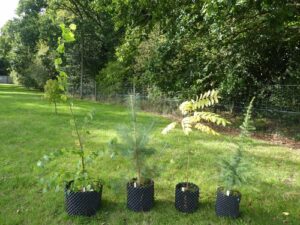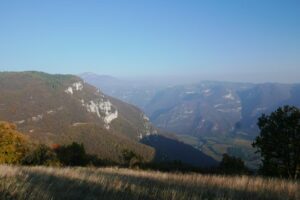As part of the Forestry Commission’s centenary celebrations, Forest Research has planted 25 trees in the grounds of its research station at Alice Holt Lodge, in the south-east of England.
The initiative is part of a wider FC centenary celebration in which commemorative avenues, glades and individual trees are being planted to mark the passing of the Forestry Act in 1919. Forest Research staff gathered earlier this week to plant the trees and unveil a commemorative plaque.
The trees planted have been selected as they are suited to the expected climate of the south-east of England in 2119 – one hundred years from now. They are a mix of conifer and broadleaf species that will enhance the existing tree collection at Alice Holt.


The trees include Small-leaved lime and Scots pine, both native species that have a wide range across Europe. These trees were collected as seed by colleagues at Westonbirt, The National Arboretum in Gloucestershire. The sites were in Italy where the climate is warmer and drier than in Britain – the type of conditions we are expecting in the future.
Also collected by Westonbirt and planted at Alice Holt is the Black walnut from the US east coast. It is a species we have not planted widely in Britain as it has generally been too cold, but expectations are that it will thrive in some areas and produce valuable timber in the future.
Another tree planted is an Atlantic cedar collected in the Atlas Mountains of Morocco by staff from Bedgebury Pinetum in Kent. This is a successful timber species on the continent but a true ‘forestry experimental tree’ in Britain.
The top picture above shows Small-leaved lime, Scots pine, black walnut and Atlantic cedar saplings waiting to be planted in the grounds of Alice Holt. The bottom picture (copyright Dan Crowley) shows the forest in Italy where the seed of the Smalled-leaved lime and other Tilia spp was collected.
All the trees planted are examples of species currently under trial in Britain. They have been carefully selected to push the boundaries of our knowledge, and Alice Holt is a great place to tell the story of what we are doing to maintain the future of forestry in Britain.
More about our research on tree species in a changing climate.
Planting woodland adjacent to established woodland or in large clumps is more likely to boost bird populations than random planting, modelling suggests.

Forest Research has announced that Dr Bianca Ambrose-Oji, currently Head of its Society and Environment Research Group, will succeed Professor Chris Quine FRSE as Chief Scientist from June 2025.
England’s non-woodland trees have been mapped for the first time, revealing these trees make up nearly one third of our nation’s tree cover.
Planting woodland adjacent to established woodland or in large clumps is more likely to boost bird populations than random planting, modelling suggests.

Forest Research has announced that Dr Bianca Ambrose-Oji, currently Head of its Society and Environment Research Group, will succeed Professor Chris Quine FRSE as Chief Scientist from June 2025.
England’s non-woodland trees have been mapped for the first time, revealing these trees make up nearly one third of our nation’s tree cover.